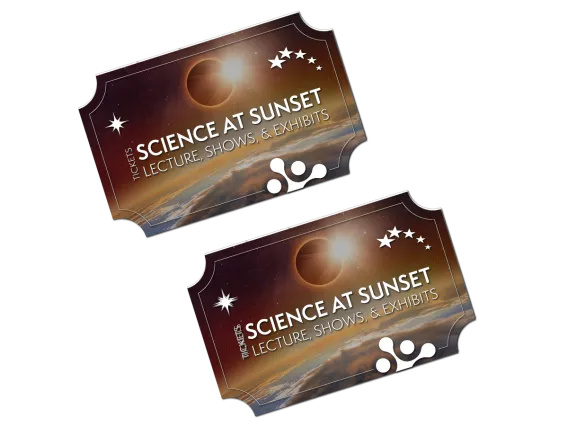When
Science at Sunset: Eclipses & The Ring of Fire
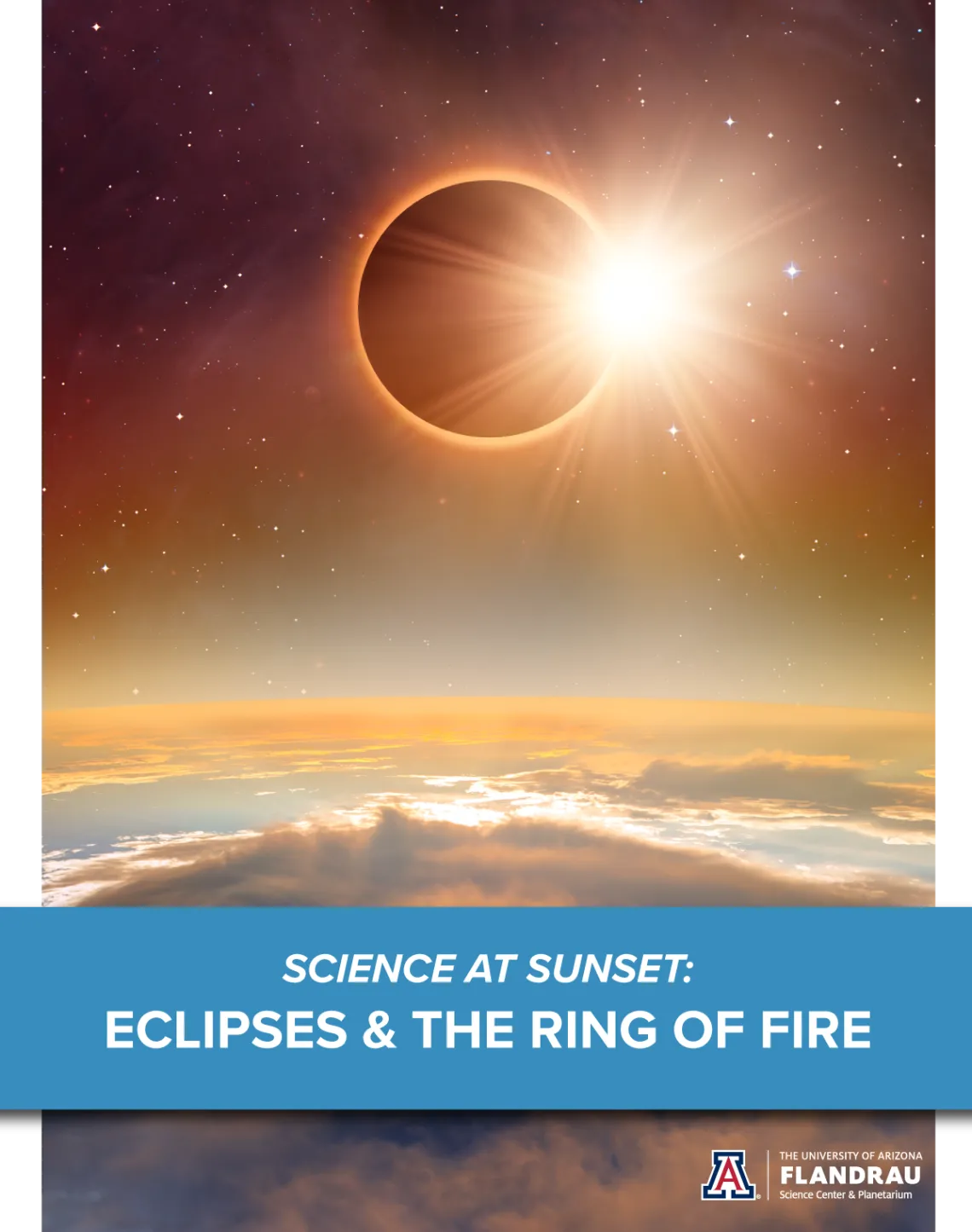
Saturday, April 6
1601 E University Blvd.
5:30PM to 10:00PM
Join us for our next Science at Sunset series and explore the fascinating astrophysics that make eclipses possible and the amazing ways the NSF observes eclipses from aircraft.
This special event features stargazing opportunities, planetarium presentations, special activities, and educational eclipse presentations from Nicole Kerrison with the University of Arizona's Lunar & Planetary Laboratory and astrophysicist Jenna Samra of the Center for Astrophysics, Harvard & Smithsonian.
Tucson's next solar eclipse is on the following Monday, April 8th.
The previous Science at Sunset event sold out in advance, so buy tickets soon!
Learn more in the Schedule of Events section below.
Ticket sales are now in-person only
All-inclusive ticket - $25
$15 for Flandrau members!
- Admission for science center exhibits, activities, stargazing
- Lecture in the planetarium with Nicole Kerrison
- Lecture in the planetarium with Jenna Samra
- Planetarium show - "Totality!"
Seating is first come, first serve and some shows may sell out. An all-inclusive ticket guarantees you a seat to the presentations and shows.
Schedule At-A-Glance
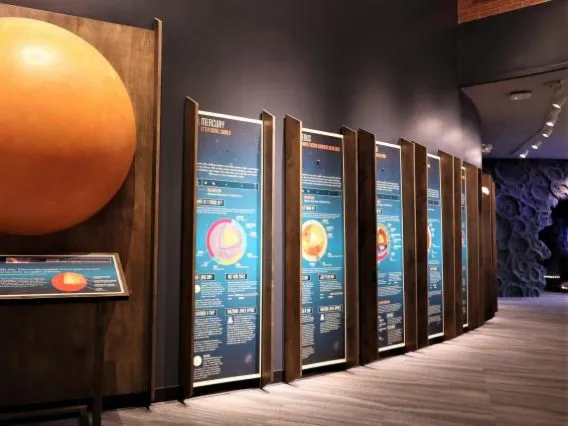
5:30-10PM - Activities
Science Exhibits and Stargazing
Reveal the marvels of the universe through exhibits, activities, and telescopes.
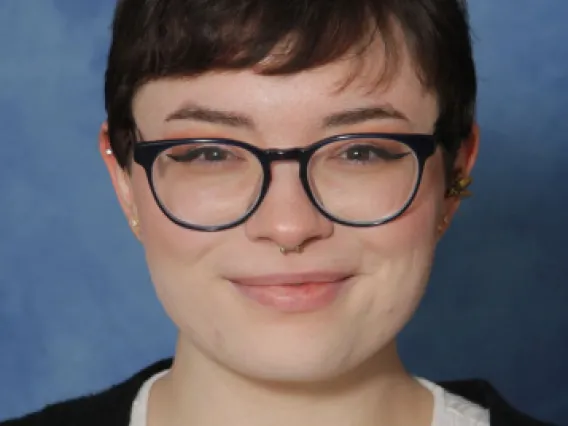
6:30PM - Eclipse Talk
"Solar Eclipses Across the Eras"
Nicole Kerrison, Graduate Student - Lunar & Planetary Laboratory
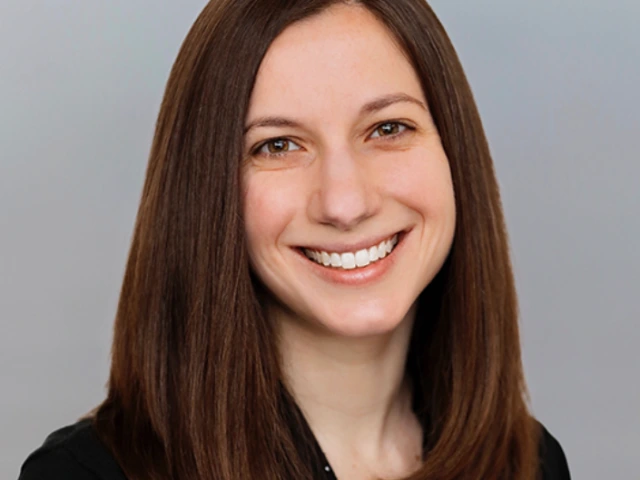
8:00PM - Eclipse Talk
"Chasing the Eclipse: The Science of ACES (Airborne Coronal Emission Surveyor)"
Jenna Samra, Astrophysicist at the Center for Astrophysics - Harvard & Smithsonian
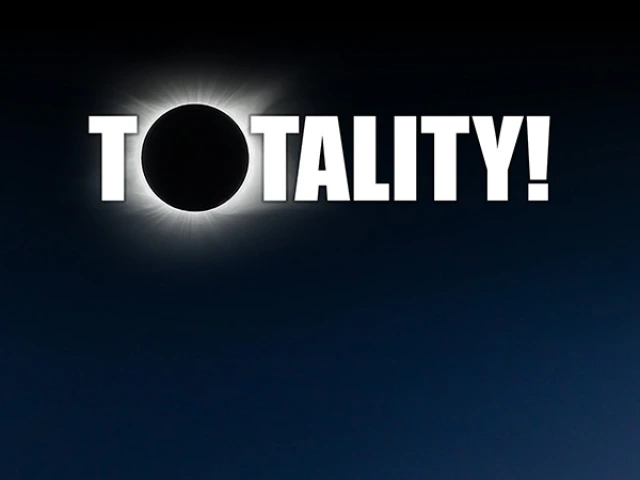
9PM - Planetarium Show
Totality!
Explore the amazing, astronomical mechanics that produce eclipses.
Detailed Schedule
Explore science exhibits that reveal the marvels of the universe from the edges of our solar system to the depths of Earth's oceans. Step outside to peer at points of interest in the night sky through telescopes with our staff and volunteers starting at 7:00PM (weather permitting). Special activities will be available on the exhibit floor until 9:30PM.
Title: Solar Eclipses Across the Eras
Description: Dive deep into the celestial phenomenon that has fascinated humanity for centuries! Join us as we explore the science behind solar eclipses and review the various ways in which solar eclipses have been interpreted and immortalized throughout human history. The talk will conclude with a planetarium demonstration, followed by time for questions.
Title: Chasing the Eclipse: The Science of ACES
Description: The Sun’s outer atmosphere (the solar corona) is notable for its million-degree temperatures and its violent eruptions, both of which are powered by energy from its magnetic field. The coronal magnetic field holds the key to understanding the heating of the corona and predicting solar flares and coronal mass ejections, but measuring it is very challenging. The Airborne Coronal Emission Surveyor (ACES) is a new instrument that will take a step toward making this difficult measurement by viewing the 2024 total solar eclipse from a high-altitude airplane.
By observing infrared light emitted by the corona, ACES will measure the corona’s temperature and density and pave the way for a future instrument that will measure its magnetic field. To view the eclipse, the instrument and its operators will fly in the National Science Foundation’s Gulfstream V aircraft at an altitude of over 45,000 feet, above the clouds and most of the infrared-absorbing gas in Earth’s atmosphere. I will talk about the solar corona, the instrument we built, and what we can learn by observing the eclipse in infrared light from an airplane.
Bio : As an astrophysicist at the Center for Astrophysics (CfA) | Harvard & Smithsonian, Jenna Samra develops remote sensing instruments to observe the solar corona and Earth's atmosphere. She leads the CfA’s high-altitude infrared coronal instrumentation program, which includes ACES. Before joining the CfA as a graduate student in 2014, she worked at MIT Lincoln Laboratory on the development of environmental monitoring sensors. Jenna obtained BS and MS degrees in Electrical Engineering from Penn State in 2006 and 2008 and received a PhD in Applied Physics from Harvard University in 2018.
This full-dome show has never been seen before at Flandrau! Totality! is a full-dome planetarium program about the upcoming eclipses. The show provides the history and geometry of eclipses followed by observing tips and a simulation of the upcoming totality. Explore the amazing astronomical mechanics that produce eclipses and the allure of solar eclipses throughout history along the way.


